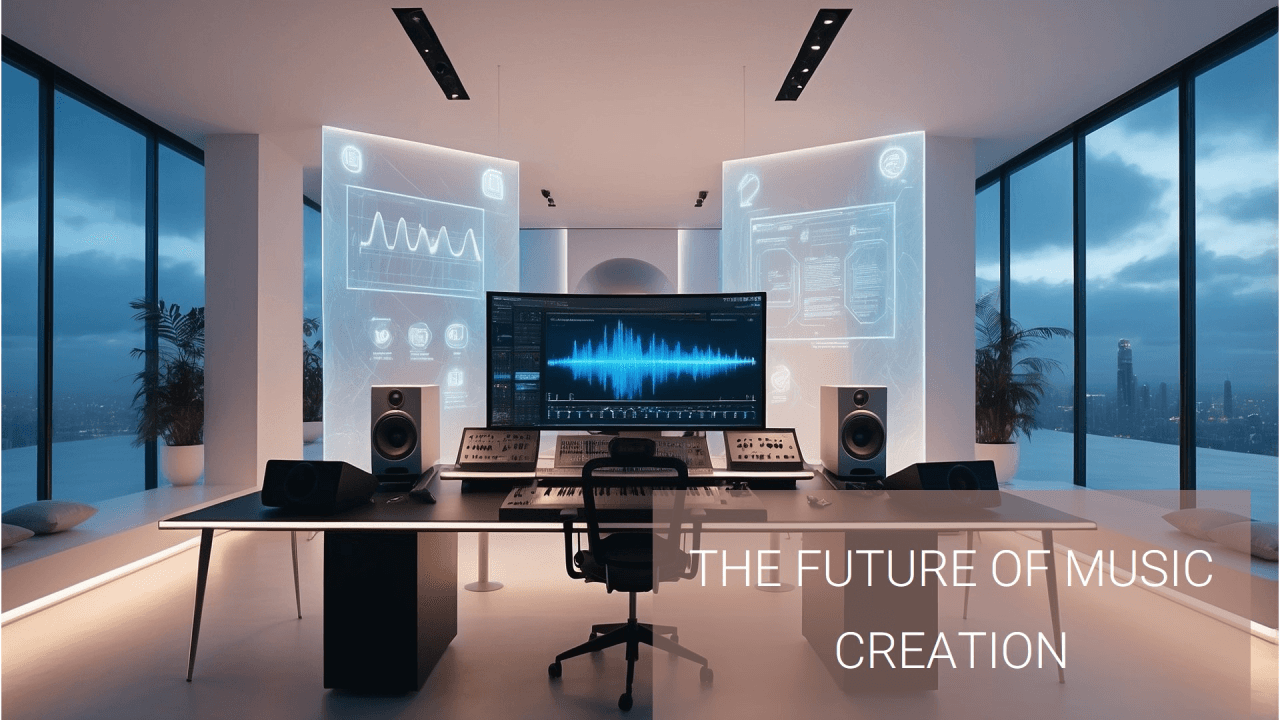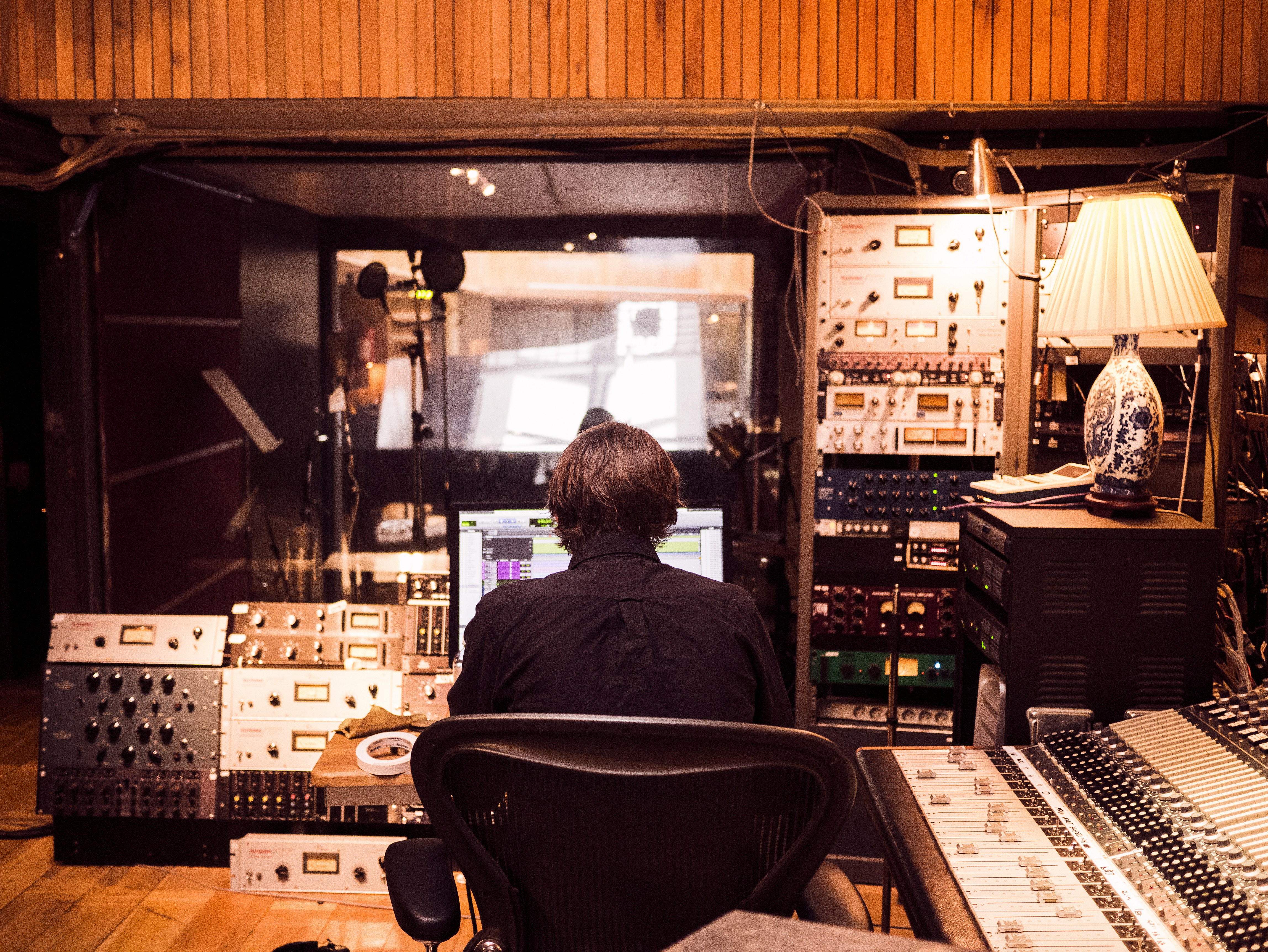Article
Jun 1, 2025
The Future of Music Creation – A Prediction
Introduction
Music is about to change in ways we couldn't imagine. AI is already changing how we make music, and it's just getting started.
After months of intensive research, hands-on experimentation, and enlightening discussions with industry leaders like Dr. Kobi Abayomi, Dr. Martin Clancy, Daniel Rowland, Tom Fritz, Christopher Wieduwilt (the AI Musicpreneur), and Drew Thurlow on my podcast, I’m convinced that we’ll witness a complete transformation of how music is made in the coming years.
Their insights have significantly shaped my understanding of what’s unfolding and how we must approach it.
Key Pillars of the AI Music Revolution:
1. Democratization of Production
2. Ideas and Context as the New Currency
3. Redefinition of Creativity
4. Content Explosion
5. Human-AI Collaboration
6. The Human Element
7. Ethical Considerations
1. The Democratization of Production
AI is tearing down the barriers to music production. Tools like Suno and Udio are giving anyone the ability to create studio-quality tracks. This is fundamentally altering the landscape of music creation. It's no longer about who has the best equipment or years of technical training; it’s about who has the best ideas.
What it means: The value of technical production skills is rapidly diminishing. If your career strategy relies solely on being the best mix engineer or session musician, it’s time to reassess your approach.
Consider this: This year, I worked with AI tools to create 7,000 songs. It felt surreal to get the same emotional connection from a song I made in minutes as one I spent weeks on. But it made me realize AI isn’t replacing us; it’s helping us.
This doesn’t imply that human-created music will become obsolete, but it underscores AI’s capability to produce emotionally resonant music at an unprecedented scale and speed.
The impact? More people than ever can now make music, but standing out will be harder. The differentiator won’t be technical skills—it’ll be originality.
With so many more people creating music, how do you stand out? That's where your ideas and stories become essential.
2. The New Currency: Ideas and Context
As AI handles more of the technical side, what will matter most is the story behind the music. Listeners don’t just connect with sounds; they connect with narratives, emotions, and the context in which the music was made.
To succeed, artists need to focus on:
Telling compelling stories
Building authentic connections
Creating experiences that go beyond sound
As Daniel Rowland, a Grammy-nominated engineer, in one of our conversations, put it:
Technology should serve the artist’s vision, not dictate it.
The artists who can craft their own worlds around their music will be the ones who thrive. By using AI tools thoughtfully, creators can focus more on the emotional and conceptual aspects of their work.
3. The Redefinition of Creativity
Creativity in music used to mean technical skill—now it’s about vision, curation, and direction. The modern music creator will be less like a traditional musician and more like a director or curator, guiding AI to bring their ideas to life.
What does this mean? We need to rethink music education. Instead of focusing purely on performance, we should be teaching:
Storytelling techniques
Brand-building strategies
AI prompt engineering
These skills may become more valuable than traditional music theory and performance. The ability to craft a compelling narrative and curate AI-generated content could supersede virtuosic instrumental skills.
Christopher Wieduwilt, the AI Musicpreneur, shared his thoughts on this evolution. He highlighted how artists who can direct AI tools effectively—those who can orchestrate and curate content—will have a significant advantage. It’s about harnessing technology to bring a unique vision to life.
This redefinition opens up new possibilities for artistic expression. Creators can focus more on the big picture—the overall emotional impact and message of their work—rather than getting bogged down in technical details. This could lead to more conceptually ambitious and thematically cohesive musical projects.
4. The Content Explosion
With AI, it’s possible to create hundreds of variations of a single song in minutes. This will lead to an overwhelming flood of content.
The challenge? Discovering and curating music will become more critical than ever:
New platforms will emerge to help listeners find what they love.
Playlist curators, tastemakers, and advanced algorithms will become essential in this crowded space.
Drew Thurlow highlighted a stark reality:
With over 200 million songs already available, AI will only increase this content overload.
Artists will need new strategies to get noticed.
5. The Human-AI Collaboration Model
The future isn’t about AI replacing humans; it’s about humans and AI collaborating in novel ways. We’re witnessing the emergence of what I call the “AI-augmented storyteller”—creators who use AI to amplify their vision rather than replace their skills.
What it means: Success will come to those who can effectively “conduct” an AI orchestra, using these tools to bring their unique vision to life. This requires a new set of skills:
1. Understanding AI capabilities and limitations
2. Crafting effective prompts to guide AI systems
3. Curating AI outputs to align with a cohesive artistic vision
Dr. Kobi Abayomi shared insights on how AI tools can assist artists in new ways, fostering collaboration that can lead to innovative musical experiences. He sees AI as an opportunity for producers and artists to have more tools at their disposal, enhancing rather than hindering creativity.
This collaborative model has the potential to push creative boundaries in unprecedented ways. By offloading certain aspects of the creative process to AI, human creators can focus more on experimentation, emotional expression, and conceptual innovation.
6. The Importance of Human Connection
As AI-generated music grows, human connection will become even more valuable. Live performances, genuine interactions, and the emotional energy that comes from sharing a space with an artist are things AI can never replace. Tom Fritz explained this beautifully on the Sound Connections Podcast.
To stand out, focus on:
Intimate live performances
Sharing behind-the-scenes content
Building communities that feel like family
Interactive experiences that highlight the human element behind the music
Dr. Martin Clancy stresses the timeless need for human connection:
As technology evolves, the desire for genuine human experiences remains constant. Artists who nurture these relationships will continue to thrive.
The key is to offer experiences that go beyond what AI can provide. While AI can generate music, it can’t replicate the energy of a live performance, the spontaneity of improvisation, or the emotional connection between an artist and their audience.
7. The Ethical Minefield
As AI becomes more prevalent in music creation, we’re entering uncharted ethical territory. Questions of authorship, copyright, and fair compensation are becoming increasingly complex.
What it means: We need robust industry-wide conversations about AI ethics in music, leading to new standards and possibly new legal frameworks. Initiatives like Dr. Martin Clancy’s AI:OK, which aims to create a trust mark for ethically created AI music, may become crucial in navigating this new landscape.
Some key ethical considerations include:
1. Authorship: Who owns the rights to AI-generated music? The person who wrote the prompt, the developers of the AI system, or some combination?
2. Training data: How do we ensure that AI systems are trained on ethically sourced data, and that original creators are compensated if their work is used in training?
3. Transparency: Should there be requirements for disclosing when AI has been used in the creation of a piece of music?
4. Fair compensation: How do we ensure fair compensation for human creators in a world where AI can generate music at scale?
Addressing these ethical challenges will require collaboration between artists, technologists, legal experts, and policymakers. It’s likely we’ll see the development of new licensing models, copyright frameworks, and industry standards to address these issues.
Looking Ahead: My Predictions
As we look to the future, here’s what I foresee:
Rapid Technological Growth: AI tools will continue to evolve, producing more emotionally resonant music.
New Skill Sets: Artists will need to master AI collaboration, storytelling, and brand-building.
Changes in Music Consumption: Listeners will crave personalized, context-rich experiences.
A Return to Live Performances: As AI becomes more common, live music will become more cherished.
New Industry Standards: Ethical frameworks around AI music will emerge.
Educational Transformation: Music schools will start teaching AI literacy, prompt engineering, and entrepreneurial skills.
Diversified Revenue Streams: Artists will explore immersive experiences, exclusive content, and community-building for new income.
The Bottom Line
The AI revolution in music isn’t a threat—it’s an opportunity. It’s a call to evolve.
For artists: Focus on developing your unique voice and vision. Your ability to tell compelling stories and create meaningful connections with your audience will be your most valuable asset. Don’t just make music; create experiences and narratives that resonate on a human level.
For industry professionals: Start thinking now about how to integrate AI into your workflows. The companies that will thrive are those that see AI as a collaborator, not a competitor. Consider how you can use AI to enhance human creativity rather than replace it.
As Daniel Rowland mentioned, embracing technology thoughtfully can lead to positive outcomes. It’s about using AI as a tool to expand creative possibilities, not as a means to an end.
For investors: Look for startups that are not just developing better AI models, but those creating tools that augment human creativity and facilitate storytelling. The most successful companies will be those that find innovative ways to blend AI capabilities with human ingenuity.
The future of music lies not in the hands of those who can play the most complex solos or program the most intricate beats. It belongs to the storytellers, the visionaries, the curators—those who can use AI as a brush to paint on a canvas that extends far beyond just sound.
This is not a future to be feared, but one to be seized. The question is: Are you ready to evolve?
The music industry has always been about adaptation, from the gramophone to streaming services. This AI revolution is the next big leap. It’s time to embrace it, shape it, and use it to create music and experiences that resonate more deeply than ever before.
Final Thoughts
AI and music are coming together to bring about a wave of change like never before. This will touch every part of the process—how we create, the way artists collaborate, the role of technology, and even the ethical questions that arise. It’s a transformation that’s reshaping the future of music.
The future of music is not a distant horizon—it’s unfolding right now. By embracing AI as a tool for innovation and by addressing the ethical and legal challenges head-on, we can be almost certain that this new era enriches the music industry rather than disrupts it.
So, will you let AI help you unlock your full creative potential?
Start experimenting today, and who knows—you might just create the next big sound.
Note: The insights and perspectives shared in this article have been significantly influenced by conversations with industry experts such as Dr. Kobi Abayomi, Tom Fritz, Dr. Martin Clancy, Daniel Rowland, Christopher Wieduwilt (the AI Musicpreneur), and Drew Thurlow on my podcast.
Other posts
Expert perspectives on venture building, startup development, and global entrepreneurship from our team of builders and innovators



